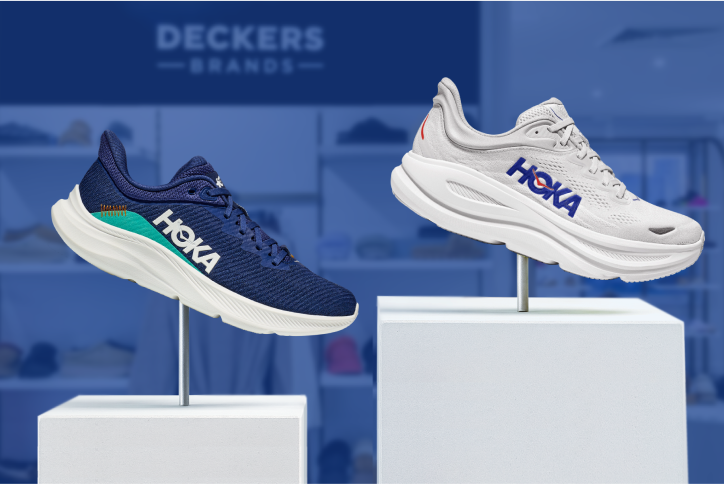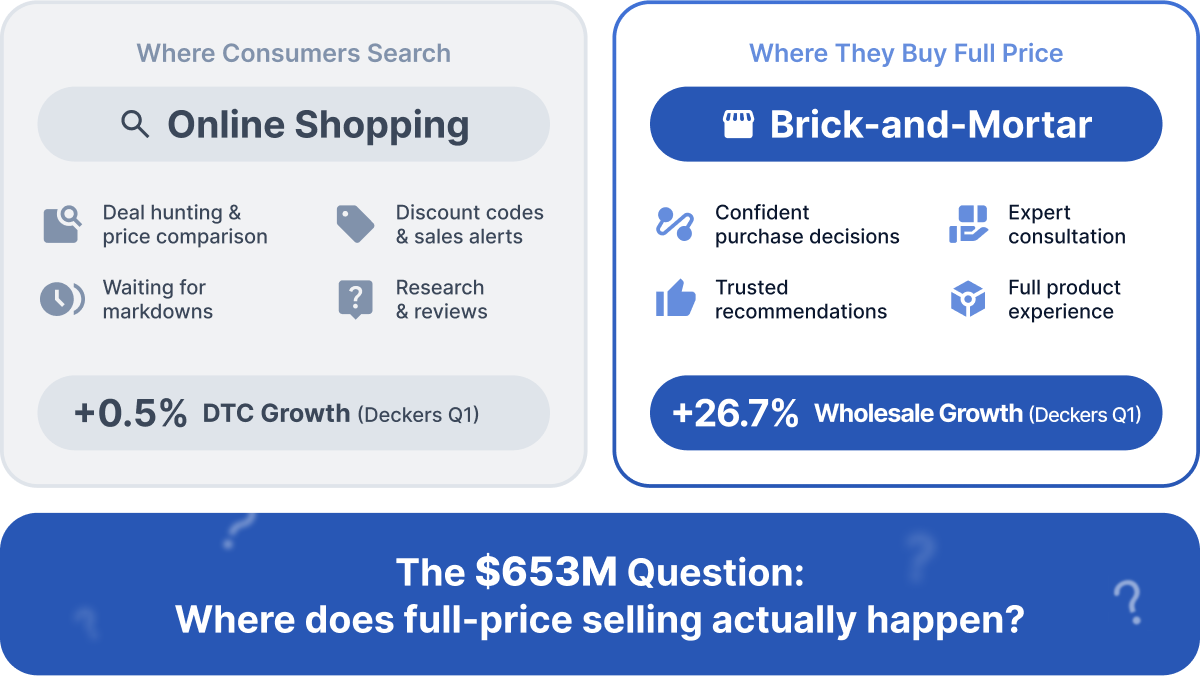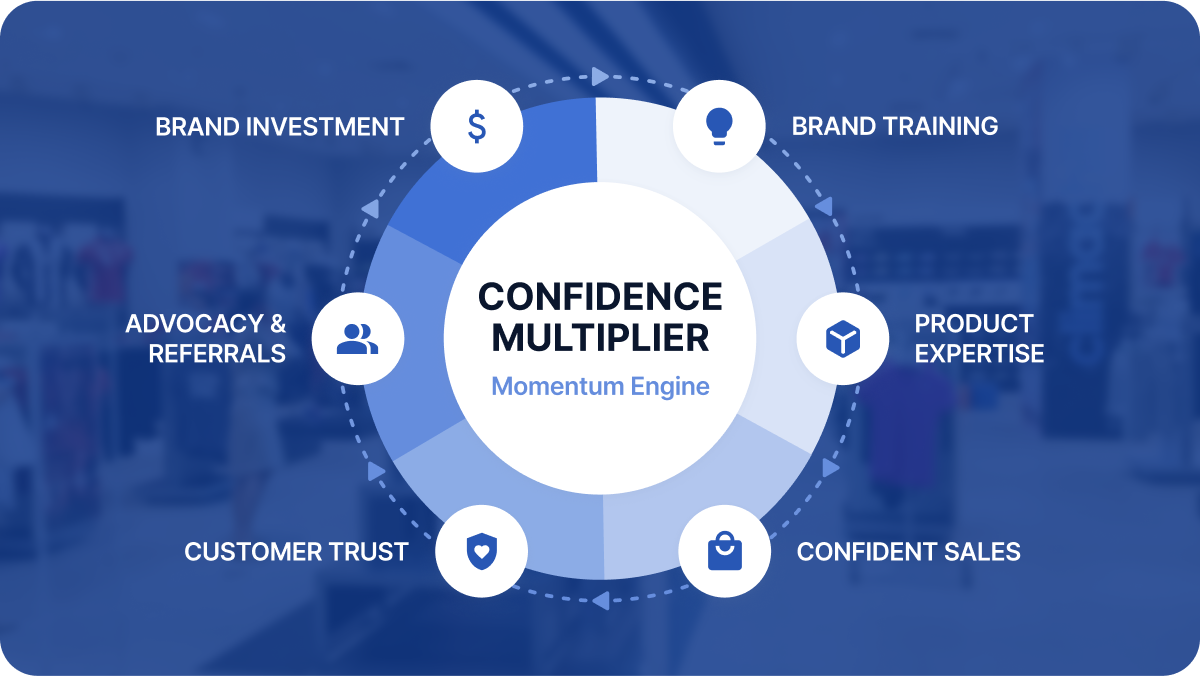How Hoka drives full-price sales through retail brand training

The untold story of how a running shoe brand cracked the code on full-price retail sales through strategic brand training and retail associate enablement
Most brand executives would kill for Deckers' Q1 results: net sales up 17% to $964.5 million, with Hoka alone driving nearly 20% growth to $653.1 million. But here's what caught my attention and should catch yours too.
While everyone's obsessing over direct-to-consumer growth, Deckers' wholesale channel absolutely exploded: up 26.7% to $652.4 million. Meanwhile, their DTC barely moved: just 0.5% growth to $312.2 million.

CEO Stefano Caroti dropped what I consider the most important insight of the quarter: "Our observations indicate that while consumers often search for deals online, brick-and-mortar stores remain the primary venue for full-price sales."
Full. Price. Sales.
In an era where everyone's racing to the bottom on pricing, Hoka figured out how to get customers to happily pay $180 for running shoes. Not on sale. Not with a coupon. Full price.
Here's what keeps me up at night: If brick-and-mortar is where full-price magic happens, why do most brands treat their retail partners like glorified warehouses?
Think about it. You spend millions perfecting your product story. You craft beautiful brand narratives. You hire world-class athletes as ambassadors. Then you hand it all over to a 19-year-old part-timer making $12 an hour and hope they can sell your $180 shoe against another brand’s latest markdown.
That's not a strategy. That's wishful thinking.
Hoka understood something fundamental that most brands miss: the moment of truth isn't when someone clicks "add to cart" online. It's when they're standing in a store, holding your product, and a retail associate either makes them feel confident about spending their money or doesn't.
Here's what I learned from watching Hoka's retail training approach up close: they don't see retail associates as the last mile of their distribution chain. They see them as the first mile of their customer experience.
When someone walks into a specialty running store asking about the latest Clifton model, that associate becomes Hoka. Not the website. Not the Instagram ad. Not the professional athlete endorsement. That person, in that moment, IS the brand.
Hoka realized that if they wanted full-price sales, they needed full-confidence associates. And full confidence doesn't come from a product spec sheet pinned to a back room bulletin board.
What you're seeing isn't traditional retail sales training. It's comprehensive brand training that transforms retail associates into product experts and brand advocates. The difference in customer interactions, and sales results, is remarkable.
Most brands think about retail training linearly: train more associates, get more sales. Hoka discovered something far more powerful, what I call the confidence multiplier.
That confidence doesn’t come from content alone. Hoka has a dedicated team of Field Experience reps who spend their days in stores, coaching associates and bringing the brand to life in real interactions.
And when those reps leave, the learning continues. Associates can dive into Hoka’s always‑on digital training to refresh their knowledge, explore new product launches, or get up to speed on day one if they’re new to the team.
This blend of in‑person activation and digital access keeps the confidence multiplier alive. Every associate steps onto the floor ready to sell with expertise, because they feel like an extension of the brand.
When a retail associate truly understands why Hoka's geometry reduces impact without sacrificing performance, something magical happens. They don't just sell shoes. They solve problems. They become consultants, not order-takers.
That confident associate sells more pairs per customer interaction. But here's the kicker, they also create customers who come back. Customers who tell friends. Customers who specifically ask for "that associate who really knows running shoes."

Suddenly, you're not just moving inventory. You're building a community of advocates who happily pay full price because they trust the source of their advice.
We've been optimizing for the wrong metrics. We obsess over distribution numbers: how many doors carry our products, what our shelf position looks like, whether we hit our shipment targets. But Hoka's success reveals a different truth: distribution without activation is just expensive storage.
Every retail partner represents dozens, sometimes hundreds of potential brand interactions every single day. The question isn't whether your product is on their shelf. The question is whether their team can authentically represent what makes your product worth buying.
Hoka built their $653 million growth engine by treating every retail employee as a potential brand ambassador. Not through corporate speak or flashy presentations, but through genuine brand training that helps associates succeed in their own careers.
Here's something fascinating about human psychology: we're more willing to pay premium prices when we feel like insiders. When someone shares knowledge that makes us feel smart, informed, special.
Discount retailers succeed by making price the hero. Premium brands succeed by making the customer the hero of an informed decision.
Hoka-trained associates don't lead with price. They lead with insight:
That informed conversation, where passion meets expertise, justifies every dollar of that $180 price tag. The product sitting silently on a shelf never could.
The genius of Hoka's approach isn't just what they teach their retail partners; it's how they make brand training feel personal and relevant, even at scale.
Instead of generic product training, they created retail enablement experiences that help associates become better at their jobs, not just better at selling Hoka. They understood that retail workers don't just want to move products; they want to genuinely help customers find solutions.
When you invest in making someone better at their job, they invest in making your brand successful. It's reciprocal value creation, not transactional knowledge transfer.
Something interesting happens when retail associates become genuine product experts through comprehensive brand training: they start talking about your brand differently everywhere. To their friends. On social media. In other contexts.
They become organic brand ambassadors because they're not just reciting talking points, they actually understand and believe in what they're selling. That authenticity shows up in every customer interaction, creating experiences that feel consultative rather than transactional.
If you're a brand leader reading this, ask yourself: What would happen if every retail associate selling your product had the same depth of knowledge and enthusiasm as your best brand manager?
That's not a fantasy. It's a choice. The choice between treating retail partners as distribution channels or treating them as the most important members of your marketing team.
Hoka made that choice. Built comprehensive retail training systems around it. And turned it into $653 million in growth. The question is: what are you going to do with that insight?